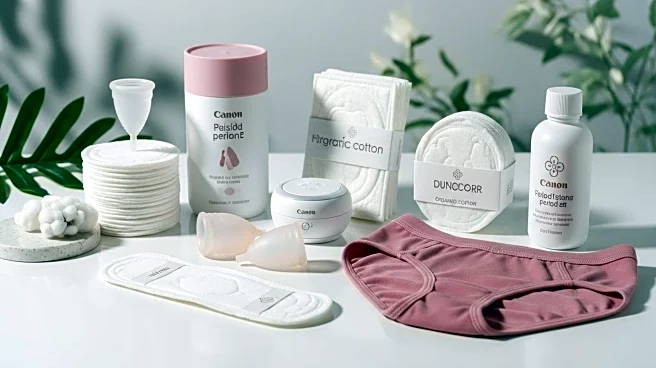What's Happening?
Yanghee Paik, cofounder and CEO of Rael, shared insights into the development and expansion of her holistic period care brand during WWD's annual L.A. Beauty Forum. The idea for Rael originated from Paik's realization of the synthetic ingredients used in traditional tampons, prompting her to create a brand focused on organic and clean products. Rael launched on Amazon in 2017, quickly becoming the top organic pad on the platform. The brand has since expanded its offerings to include products addressing various aspects of women's health throughout their cycle, such as hormonal acne and mood changes. Rael's products are now available at major retailers like Target, Walmart, and CVS.
Why It's Important?
Rael's success highlights a growing consumer demand for transparency and natural ingredients in personal care products. By addressing the broader health impacts of the menstrual cycle, Rael is setting a precedent for comprehensive women's health solutions. The brand's innovative approach, including its global collaboration model, positions it as a leader in the industry, potentially influencing other companies to adopt similar strategies. This shift towards holistic care could lead to increased competition and innovation in the feminine care market, benefiting consumers with more choices and better products.
What's Next?
Rael plans to continue its expansion by leveraging its strong marketing and product development teams. The brand aims to maintain its momentum through educational initiatives and partnerships with influencers to enhance consumer awareness. As Rael continues to innovate and introduce new products, it may further solidify its position in the market and influence industry standards. The company's focus on global collaboration could lead to the introduction of novel technologies and ingredients, keeping it at the forefront of the feminine care industry.
Beyond the Headlines
Rael's approach to period care reflects broader societal shifts towards sustainability and health consciousness. The brand's emphasis on education and transparency aligns with increasing consumer expectations for ethical business practices. As more companies adopt similar models, there could be significant cultural changes in how feminine care products are perceived and utilized. This movement may also spark discussions on women's health education and the importance of informed consumer choices.









